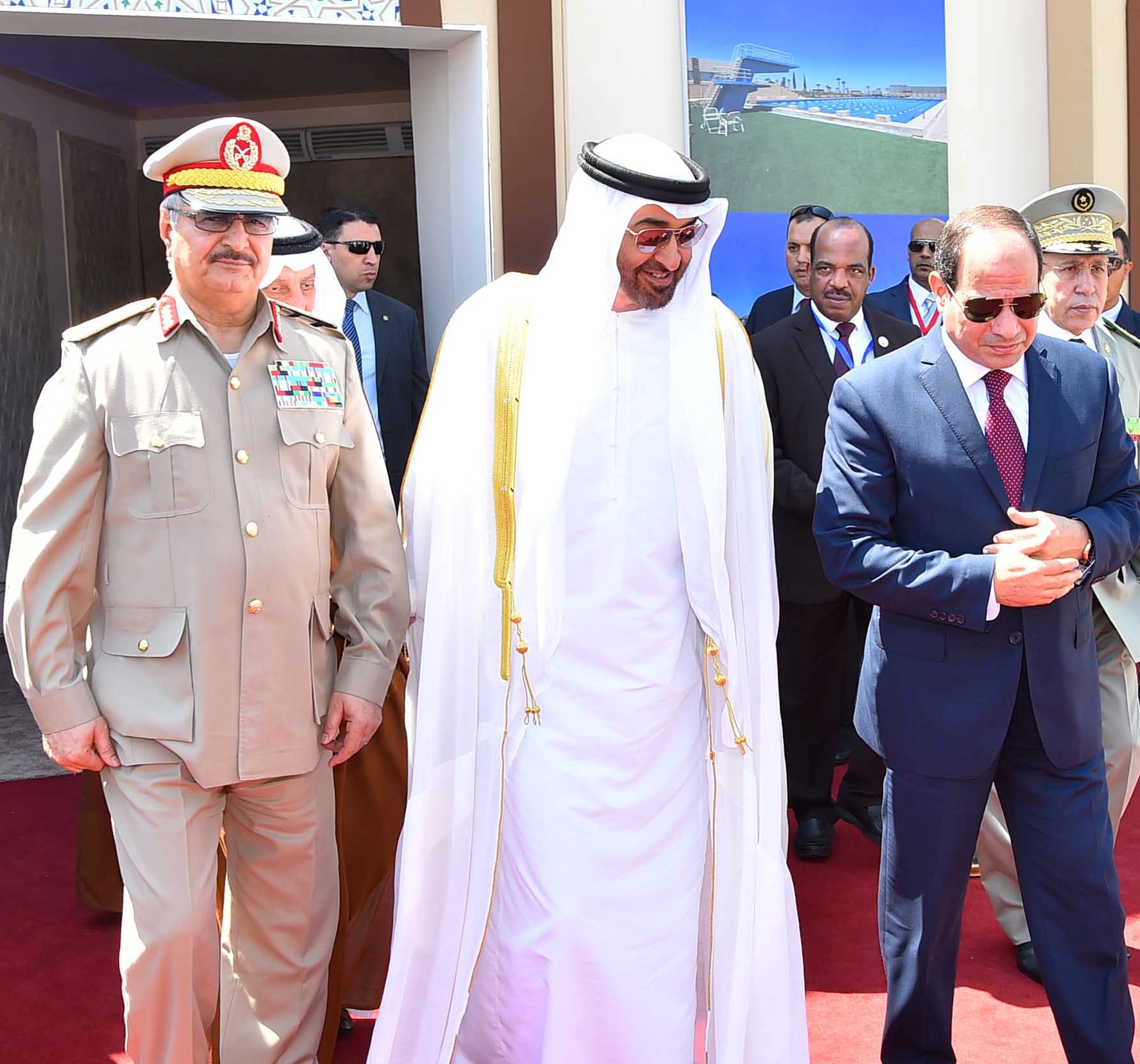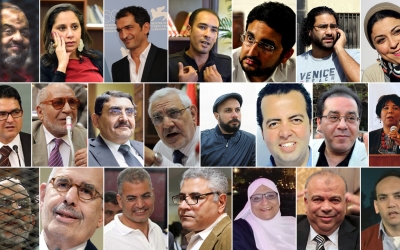Game not over: How the ordinary heroes of the Arab Spring are still resisting
5 July 2019 07:39 UTC | Last update: 2 hours 1 min ago
The demands for justice, transparency and a share in the decision making are growing in 2019, just as much as they were in 2011

Police officers prevent demonstrators from marching during a May Day protest on Labour Day in Algiers, Algeria, 1 May (Reuters)
A few months before he was shot dead by security forces during a deadly crackdown on the peaceful sit-in in Khartoum, Abbas Farah, a 28-year-old Sudanese engineering graduate and a devoted attendee of the sit-in, wrote on Facebook: "The blood of the martyrs and the establishment of rights is more important than the treasures of the earth."
For military regimes all over the Middle East, it was supposed to be the other way round. The treasures of the earth - money, oil, wealth - were supposed to supplant democracy and human rights.
When the Saudi-UAE alliance funded and organised the toppling of the first and only democratically elected president in Egypt's recent history, the military coup on 3 July 2013 was supposed to have ushered a new authoritarian era, all over the Arab world.
But six years on, things are not going to plan.
A new era
Mass protests should not be happening in Sudan and Algeria. Sudanese graduates like Farah should not be demanding basic human rights. The Sudanese should not be marching in their tens of thousands chanting "freedom, freedom".
Algeria, of all places, the land that endured a decade of civil war between Islamists and the state and stayed largely quiet during the Arab Spring, should not now be demanding an end to military rule and military imposed candidates.
The military coup on 3 July, 2013 in Egypt was supposed to have ushered a new authoritarian era, all over the Arab world
Egypt should have been stabilised by now, the middle class growing and its economy restored. Next to it a Libyan president called Khalifa Haftar should have been by now in firm control of Tripoli and sending the oil Egypt's way.
The democratic experiment in Tunisia should have been long over by now. In Yemen, Ali Abdullah Saleh's son, Ahmed, should have been installed in power and surrendering Yemen's ports to his lord and master in Abu Dhabi.
The Egyptian coup on 3 July 2013 was intended to be the fulcrum on which events in the region turned. It was the day when demands for democracy in the Arab world should have been put to rest, and a new era of rejuvenated autocracy installed.
An incriminating speech
As Abdel Fattah el-Sisi himself said, when he was still acting as Mohamed Morsi's loyal defence minister, the Egyptian people were "playing with fire" by demanding a return to military rule.
The army is fire, do not play with it ... If the army takes to the street, then forget about Egypt for 30 or 40 years- Abdel Fattah el-Sisi on 12 May 2013
In what is now a highly self incriminating speech, not least because he was to carry exactly what he himself warned should not be done, Sisi said on 12 May 2013:
"The army is fire, do not play with it ... If the army takes to the street, then forget about Egypt for 30 or 40 years. We are from the army, and we know it well, and know its capabilities.
"What you see here is tiny bit of the army of Egypt. No one should think about solving their problems by the army. If I have the choice to destroy the country or stand for 10 or 15 hours waiting [in lines] to cast my vote at the ballot box, what shall I do?
"You have never been through this, and you do not know, forgive me for telling you so. You do not know what it means for these [troops] to be in the streets. You do not know what it means for the army to be deployed in streets and to fire [at people]. This is a country of 90 million. I am just clarifying things to you.
"This is a very very very dangerous situation. The priority is Egypt's security and interest. The Egyptian state should remain the state. We should not pay a price in order to learn a lesson. After 10 years [of army intervention] we will regret and say 'we wish we never did it'."
This is, of course, what Egyptian liberals, who supported Sisi to get rid of Morsi on 3 July but then in turn fell victim to him, are now thinking: We wish we never did.
A simmering discontent
Six years on, Egypt is a simmering mass of discontent. The middle class is squeezed. The poor are growing poorer. No one knows where or when trouble will erupt, or whether, like Sudan, it will take the shape of a popular uprising. However, they do know one thing: things cannot go on like this for another six years, let alone 30 or 40 years.

The World Bank, which supports what it calls Sisi's "bold reforms,” is deeply ambivalent. On the one hand it notes macroeconomic progress - real GDP grew by 5.3 per cent last year, inflation is down, and the current account deficit has narrowed, but on the other it notes damningly :
"Some 60 percent of Egypt's population is either poor or vulnerable, and inequality is on the rise. The national poverty rate was close to 30 percent in 2015, up from 24.3 percent in 2010 as reported in the CPF.
"There are striking geographical variations in poverty rates, ranging from a low of about 7 percent in Port Said governorate to a high of 66 percent in some governorates in Upper Egypt. Furthermore, the economic reforms took a toll on the middle class, who face some higher costs of living as a result of the reforms."
Put this another way. Part of Sisi's austerity measures, currently going through parliament, is a proposal to increase the age of retirement to 65 by 2027. The life expectancy for Egyptian men is 68. That would leave the average man in Egypt all of three years of retirement.
The human cost of maintaining an absolute ruler in power over six years has also been steadily rising.
The human cost
The Arab Organisation for Human Rights in the UK, whose figures are conservative and based only on documented cases, has tallied the following deaths in the last six years: 3,185 Egyptians have been killed by Sisi's security forces, 2,194 in peaceful protests; 766 killed in detention centres, including 516 out of medical negligence.
One hundred and eighty people have been assassinated in extrajudicial killings; 45 citizens have been executed, and 83 are on death row. Some 63,000 people have been arrested, including 691 women and 1,161 minors.
Those figures could have come from a war zone. But they refer simply to the Egyptian mainland. In Sinai, where a real war is taking place, 4,441 people have been killed, and 11,6724 arrested. Over 3,000 houses have been demolished in the Rafah border area with the displacement of over 3,000 families.
Sisi, the bold reformer? Would the World Bank now describe Pinochet or Galtieri, who murdered similar numbers of Chileans and Argentinians, in the same breezy way?
Egypt's neighbours
Look to the west of Egypt and the picture is no rosier. There can be no doubt who supports, arms and funds the renegade and self-proclaimed field marshal, Khalifa Haftar, who broke off internationally sponsored talks with the government in Tripoli to seize it by force in what was supposed to be a lightning strike.
Haftar paid court to Saudi Arabia's King Salman on the eve of his offensive and has been in Egypt twice since.
The lightning strike has turned into a three-month campaign, which came to a juddering halt when forces loyal to Tripoli, resupplied with Turkish weapons, seized Haftar's main supply base in Gharyan.

Twenty-four hours after the spokesman for Haftar's self-styled Libyan National Army (LNA) said it would start heavy air strikes in Tripoli, after "traditional means" had been exhausted, planes bombed a detention centre used to hold refugees migrants trying to reach Europe.
At least 53 were killed and 130 injured in a strike which the UN is investigating as a war crime. It will not be the first Haftar's forces have committed.
To the south, Sudan's uprising is delicately poised. But after Sudan's own mini Rabaa massacre, where over 100 protesters were killed on 3 June, the protest movement remains resolute, focused and clear about whom they are fighting against and what they are fighting for.
African Union and Ethiopian mediators have developed a blueprint for a "civilian majority" governing body. On Friday, Sudanese opposition and military council reached a power-sharing deal whose details are still sketchy and which has already been met with some scepticism by protesters.
In Yemen, a four-year war launched by Saudi Crown Prince Mohammad bin Salman in 2015 is exhausting its allies. The Wall Street Journal cited Western officials reporting that Abu Dhabi had begun pulling tanks and attack helicopters out of the country, including those close to the strategic port of Hodeidah.
It's a move that lays bare the divisions between the anti-Houthi groups. At any rate, all pretence at liberating Yemen from the Houthis has gone.
An epic battle
None of this means the game is over. The strongest Arab states are the most repressive. Their leaders have so much blood on their hands that there is no way back for them. Only a bullet or a bomb will stop them ruling for the next four decades. They have in Donald Trump a US president who actively supports and arms them, as do European powers.
They have the money and arms, and can buy as many mercenaries as they need. They have formed a strategic alliance with Israel, the strongest army in the region. But the project itself to launch a new model of authoritarian government is failing.
The demands for justice, transparency, a share in the decision making are growing in 2019 , just as much as they were in 2011. Despite a massive wave of repression used against them, the ordinary heroes of this epic battle are resisting.
The views expressed in this article belong to the author and do not necessarily reflect the editorial policy of Middle East Eye.



0 Comments:
Post a Comment
Subscribe to Post Comments [Atom]
<< Home